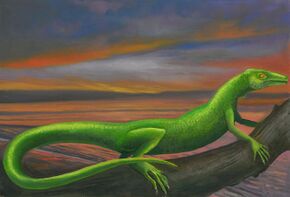Biology:Thadeosaurus
| Thadeosaurus | |
|---|---|

| |
| Restoration | |
| Scientific classification | |
| Domain: | Eukaryota |
| Kingdom: | Animalia |
| Phylum: | Chordata |
| Class: | Reptilia |
| Clade: | Diapsida |
| Clade: | Neodiapsida |
| Family: | †Younginidae |
| Genus: | †Thadeosaurus Carroll 1981 |
| Type species | |
| †Thadeosaurus colcanapi | |
Thadeosaurus is an extinct genus of diapsid reptile belonging to the family Younginidae. Fossils have been found in the Lower Sakamena Formation (Sakamena Group) of the Morondava Basin, Madagascar in 1981, and date to the late Permian to the early Triassic period.[1]
Description

Thadeosaurus was a lizard-like animal, with a remarkably long tail that comprised about two thirds of the animal's total length of 60 centimetres (24 in). It also had long toes, especially on the hind legs, which would have given it a powerful stride, since the toes would still touch the ground while the foot was being raised. Combined with a strong breast bone to increase the strength in the forelimbs, this means that Thadeosaurus was probably a good runner.[2]
Below is a cladogram from Reisz et al. (2011) showing the phylogenetic position of Thadeosaurus among other early diapsids:[3]
| |||||||||||||||||||||||||||||||||||||||||||||||||||||||||||||||||||
References
- ↑ Carroll, R. L. (1981). "Plesiosaur ancestors from the Upper Permian of Madagascar". Philosophical Transactions of the Royal Society. B 293 (1066): 315–383. doi:10.1098/rstb.1981.0079. Bibcode: 1981RSPTB.293..315C.
- ↑ Palmer, D., ed (1999). The Marshall Illustrated Encyclopedia of Dinosaurs and Prehistoric Animals. London: Marshall Editions. p. 84. ISBN 978-1-84028-152-1.
- ↑ Robert R. Reisz; Sean P. Modesto; Diane M. Scott (2011). "A new Early Permian reptile and its significance in early diapsid evolution". Proceedings of the Royal Society B 278 (1725): 3731–3737. doi:10.1098/rspb.2011.0439. PMID 21525061.
Wikidata ☰ Q2110877 entry
 |

